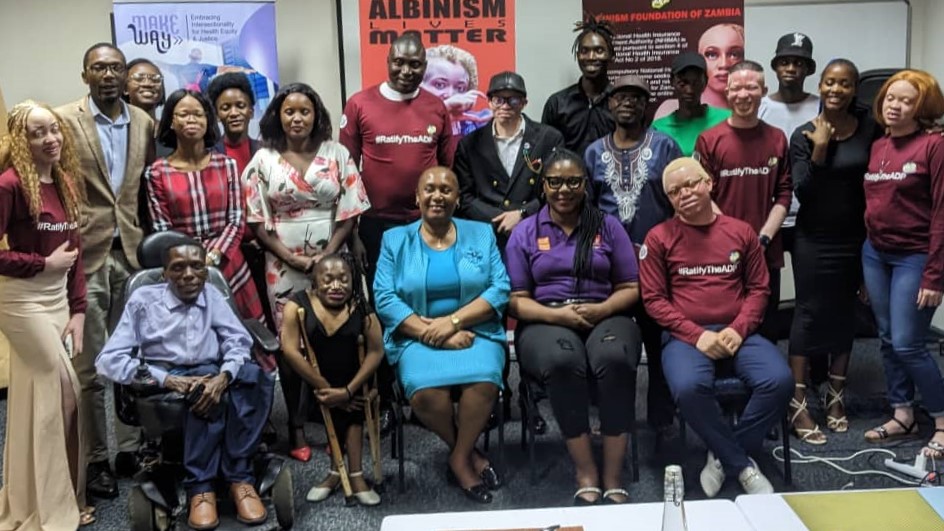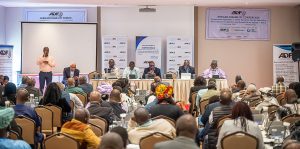The African Disability Protocol: Advancing Disability Rights in Africa
 03 December 2024
03 December 2024

The African Disability Protocol, formally titled the ‘Protocol to the African Charter on Human and Peoples’ Rights on the Rights of Persons with Disabilities in Africa’, is a groundbreaking framework tailored to the unique challenges faced by persons with disabilities across the continent. Adopted in 2018 at the African Union Summit, it recognises and addresses the specific cultural, social, and systemic issues impacting disability rights in Africa, including sexual and reproductive health and rights (SRHR). That is why partner organisations in the Make Way programme have been actively advocating for its ratification by at least 15 member states. This work came to fruition in June 2024, with the African Disability Protocol’s official ratification. The work continues though to ensure more countries ratify, sign on and implement the African Disability Protocol into laws and policies.
Advocacy for ratification: The role of the Make Way programme
The Make Way programme, through organisations like Cheshire Homes Society of Zambia (CHSZ), Cheshire Disability Services Kenya (CDSK), Forum for African Women Educationalists of Zambia (FAWEZA), Liliane Foundation, United Disabled Persons of Kenya (UDPK), VSO Nederland and Zambia Federation of Disability Organisations (ZAFOD), has been pivotal in driving advocacy for the ratification of the African Disability Protocol. These efforts include consultative workshops, capacity-building sessions for media and community-based organisations, and public awareness campaigns using radio, television and other informational and educational material materials.
In Zambia, advocacy efforts have targeted government bodies such as the Ministry of Community Development and Social Services and the Ministry of Justice. Cheshire Homes Society of Zambia with technical support from the Liliane Foundation, has been mobilising programme partners and organisations of persons with disabilities to advocate for the signing and ratification of the African Disability Protocol. With the support of a Make Way small grant, ZAFOD engages parliamentarians through the Disability Caucus Committee to ensure that policymakers understand the importance and urgency of the Protocol.

At the African Disability Forum in September 2024 in Nairobi, Kenya.
In Kenya, the ratification of the Protocol in 2021 marked a milestone. Organisations Cheshire Disability Services Kenya and United Disabled Persons of Kenya actively participated in regional advocacy workshops, including the African Disability Forum in 2021. These workshops emphasised the importance of health, education, and livelihoods, and underscored the Protocol’s role in achieving the African Union’s Agenda 2063 for inclusive development.
“I would like to appeal to you to partner with the African Union (AU) to step up our advocacy for ratification and implementation of the ADP as well as supporting the implementation of the AU Disability strategic framework and the plan of action on albinism will ensure that we have an inclusive and accessible Africa in our lifetime.”
– Dr. Jane Marie Ong’olo, Head of the Division Social Welfare Vulnerable Group Drug Control and Crime Prevention Department of Health Humanitarian Affairs and Social Development from the African Union Commission.
Next Steps and Regional Advocacy
While significant progress has been made, much work remains to ensure widespread ratification and implementation of the African Disability Protocol. Cheshire Homes Society of Zambia, ZAFOD, and their partners continue to urge governments like Zambia’s to finalise their commitment to the Protocol. The next steps include:
- Strengthening parliamentary engagement to build champions for disability rights.
- Continuing public awareness campaigns through various media platforms.
- Hosting webinars and collaborative initiatives with global partners leading up to the 2025 Global Africa Disability Summit.
- Advocating for the integration of African Disability Protocol provisions into national legislation and policies.
In the broader African context, advocacy efforts will persist in urging remaining member states to ratify the Protocol and prioritise disability inclusion in their development agendas.
Conclusion
The African Disability Protocol serves as a cornerstone for advancing disability rights on the continent, addressing the intersectional and unique challenges within African contexts. Its ratification and implementation will not only uphold the dignity and rights of persons with disabilities but also align with global and regional commitments like the Sustainable Development Goals (SDGs) and Vision 2030, ensuring no one is left behind.
The efforts of programmes like Make Way and their partners exemplify the collaborative approach needed to turn the promises of the African Disability Protocol into actionable realities. As we look towards 2025 and beyond, the message is clear: disability rights are human rights, and investing in inclusive policies benefits not only individuals with disabilities but entire communities and nations.
The African Disability Protocol
Unlike the global UN Convention on the Rights of Persons with Disabilities, the African Disability Protocol is distinctly African, incorporating context-specific challenges such as harmful traditional practices, stigmatisation tied to cultural beliefs and the role of family and community in supporting persons with disabilities. It also emphasises the protection of minority groups, such as people with albinism, and promotes community-based rehabilitation.
It provides a progressive legal framework that addresses a wide range of disability rights, including sexual and reproductive health and rights (SRHR). It guarantees the following:
- Protection for women with disabilities from sexual and gender-based violence, with provisions for rehabilitation and psychosocial support.
- Assurance that women with disabilities retain control over their fertility and are not subjected to sterilisation without their consent.
- Elimination of discrimination in accessing sexual and reproductive health services.
- Promotion of inclusive SRHR education for youth with disabilities.
Article 14 emphasises the importance of community-based healthcare, recognising the role of local leaders and health promoters in reaching persons with disabilities. Article 27 focuses on integrating gender perspectives in policies and ensuring inclusive health services.
The Protocol not only highlights cultural and systemic challenges but also provides a roadmap for overcoming them through legislative, policy, and administrative measures. Its adoption and implementation will help reshape the narrative around disability in Africa, positioning disability rights as central to development agendas.



